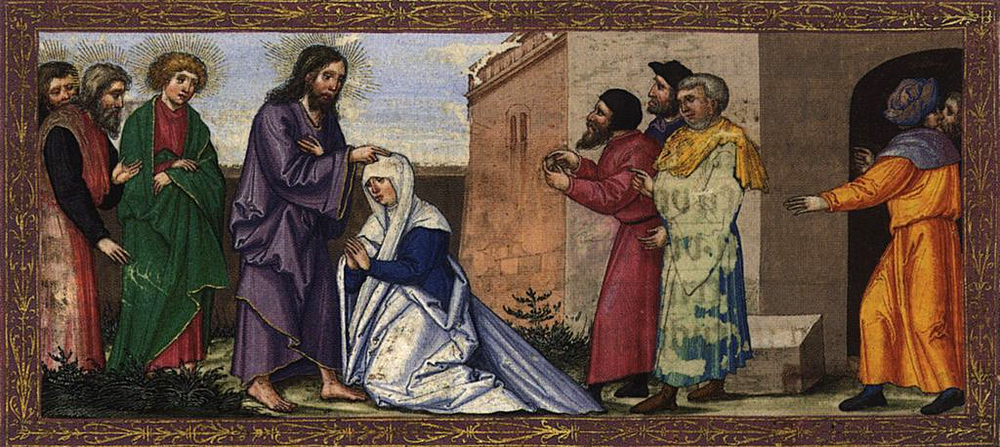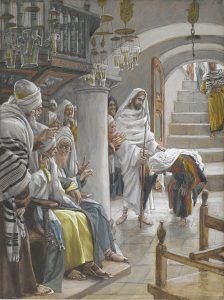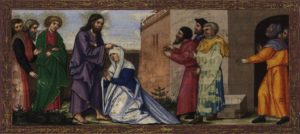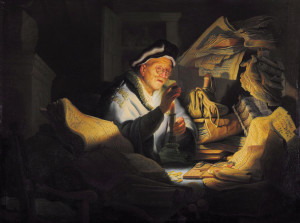Illuminations on the Lectionary readings for Aug. 24, 2025 (Pentecost 11C/Proper 16)

Heilung der gichtbrüchigen Frau am Sabbat (Healing the paralyzed woman on the Sabbath). Illumination in the Ottheinrich Bible (c.1530-1532). Bayerische Staatsbibliothek, the Bavarian State Library. (Click image to enlarge.)
First Reading (Track One): Jeremiah 1:4-10
Whenever God calls a prophet, the prophet-to-be almost invariably resists. Moses thought he couldn’t speak well enough. Jonah didn’t like the people of Nineveh and ran away. Isaiah thought his unclean lips weren’t up to the job. And Jeremiah? He doubted that he was old enough for this important job, telling God, “Truly I do not know how to speak, for I am only a boy!” But God reassured him: Even before Jeremiah was born, God knew him, and knew that he would be a prophet to nations and kingdoms, with power “to pluck up and to pull down, to destroy and to overthrow, to build and to plant.”
First Reading (Track Two): Isaiah 58:9b-14
The great prophetic book of Isaiah actually contains the work of three ancient writers in sequence, Bible scholars say. The first Isaiah prophesied the coming destruction of Jerusalem and the temple; the second Isaiah may have written from within Israel’s exiled community in Babylon; and the third Isaiah, who spoke Sunday’s verses, prophesied soon after the exiles returned home. The city and the temple lay in ruins, and the people were having a hard time settling back in. God will help us, the prophet promises; but we must be just, share with the needy, and care for the afflicted. Do all this, the prophet says, and honor the Sabbath, and Judah’s ancient glory will be restored.
Psalm (Track One): Psalm 71:1-6
Sunday’s short Psalm fits well with the Track One first reading from Jeremiah. In these verses, the Psalmist speaks from a place of weakness and fear. Caught in the hand of the wicked, in the clutches of the evildoer and the oppressor, he calls out to God for refuge, seeking God’s protection and help. God knows us, as God knew Jeremiah, from before our birth. God is our strength and our hope, sustaining us through all our lives.
Psalm (Track Two): Psalm 103:1-8
The people must have sung a hymn much like this one to celebrate their arrival back in Jerusalem after the exile. Its message of thanksgiving has made it a favorite from ancient times down through the ages: “Bless the Lord, O my soul!” As we sing, we remember that God forgives us, heals us, and redeems us. We can count on God’s mercy and grace, gentle spirit, and abundant love. We know that God insists on righteousness and justice for all who are oppressed.
Second Reading: Hebrews 12:18-29
This week’s reading from the Letter to the Hebrews recalls how Moses received the Ten Commandments: The people were terrified. The sky went dark. Lightning flashed, thunder roared, and the earth shook with God’s power. But now, the author declares, continuing his extended argument that Christianity is the better way, we have a new covenant under Jesus. God gives us through Christ a kingdom that cannot be shaken.
Gospel: Luke 13:10-17
As an observant Jew and charismatic rabbi, Jesus knew well and faithfully followed the law demanding strict observance of the Sabbath. But his compassion for a painfully disabled woman compelled him to interrupt his teaching in order to heal her right there in the synagogue! The leader of the synagogue was outraged at this breach of the Sabbath rules, but Jesus reminded those who complained that they wouldn’t hesitate to protect their own property on the Sabbath. Why should a woman who has been in pain for 18 years have to wait even another hour?




